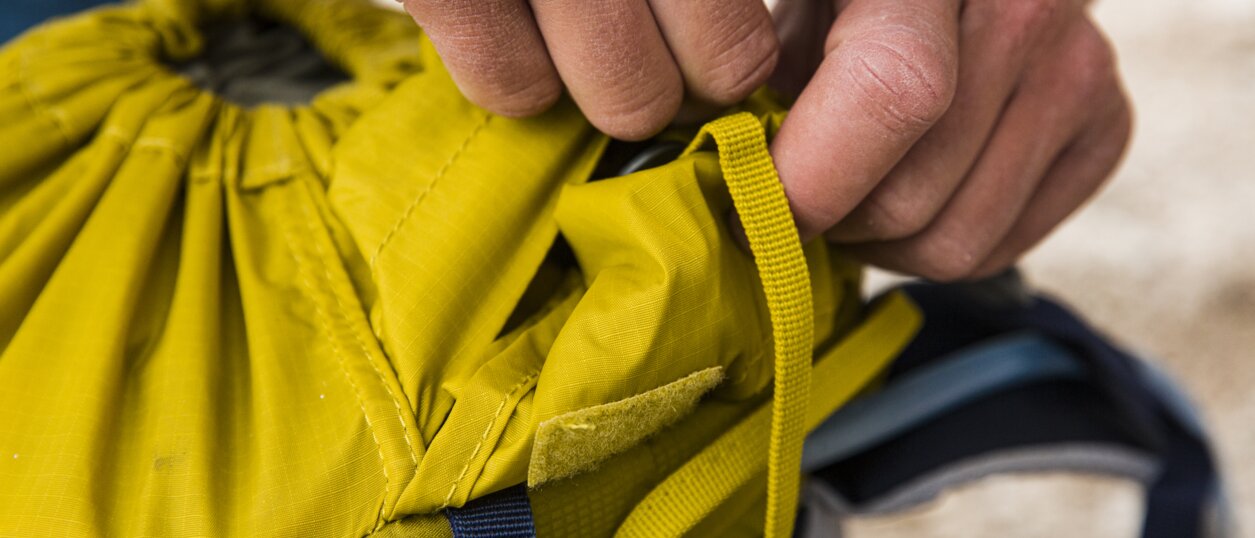
Your backpack is your trusty companion on so many adventures. But with regular care and cleaning you can make sure that it lasts for as long as possible. So here are some practical tips on washing, drying, waterproofing and storing your backpack.
While backpacks aren’t worn directly against the skin like clothing, extended use and long hikes can cause dirt buildup. If your backpack becomes heavily soiled or sweaty, washing may be necessary. For light dirt or superficial grime like mud specks or pollen, spot cleaning with a damp cloth should be sufficient.
Note: Dirt is easier to remove when cleaned promptly, ideally right after your hike.
After a summer of hiking, your deuter backpack may have accumulated dirt and sweat stains. It’s important to clean it correctly to maintain its durability. Avoid washing your backpack in a washing machine, as the abrasion can damage the material and PU coating, leading to long-term wear. Detergent residue left behind can also cause skin irritation, especially for those with sensitive skin. Additionally, the combination of sweat, detergent, and UV rays can accelerate material degradation.
The gentlest way to clean your backpack is to submerge it in a bowl or bathtub filled with water, depending on its size, and wash it using a pH-neutral soap or mild shower gel. Use a brush to gently scrub away dirt. For salt stains on the straps, repeatedly squeeze them out with soap and plenty of water. Make sure the backpack is thoroughly dried afterward and stored in a dry, well-ventilated area.
Please note that our backpack frames and support systems are not designed to be disassembled for cleaning. In our experience, attempting to remove and reassemble these components can cause damage that may not be repairable.
After completing your hike, ensure your backpack remains in optimal condition for future adventures by following these essential care steps:
Incorporating these simple post-hike storage practices can extend the lifespan of your backpack, better relying on its durability and performance throughout your outdoor endeavors.
Drying your backpack properly is not just important after you’ve washed it, but after a long day out too. Because it will have absorbed sweat and might have even been through rain showers. And so, it’s important to air it properly.
For the first few years, backpack material remains adequately watertight. However, prolonged exposure to rain can allow water to seep through zippers and seams. For mountain trekking, climbing, and ski tours, using watertight pack sacks inside the backpack can protect your belongings from getting wet. The advantage: all attachment loops for carrying equipment—like ice picks, skis, poles, or snowshoes—remain easily accessible. Hiking and trekking backpacks benefit from using a rain cover. For older models, re-applying waterproofing treatments only provides short-term protection. These treatments (spray and bath impregnations) can penetrate the base layer and potentially cause skin irritation.
To ensure you enjoy your deuter trail running vest for as long as possible, follow these care instructions:
You can also find the most important care instructions for the trail running vest on the care label sewn into the vest.
If your backpack has gotten a lot of sweat or dirt, for example after a long hike, washing is unavoidable. If you only notice light, superficial dirt such as small splashes of dirt or pollen, it is sufficient to clean your backpack or rain cover directly after your hike. All you need is a damp cloth. If there is more dirt, you may have to wash the rucksack properly.
Backpacks should not be washed in washing machine. This puts abrasive stress on the material and the PU coating and will cause damage in the long run. Also, detergent residues often remain. For sensitive skin types, this can lead to skin irritation on the shoulder straps, for example. A chemical reaction of sweat, detergent residues and UV radiation also promotes faster degradation of the materials. Do not wash your rain cover in the washing machine either.
Especially in the first few years, our high-quality backpack material and the DWR impregnation still keep it sufficiently waterproof. However, sometimes - especially after a thorough wash - a re-impregnation may be necessary. You can easily test this by dripping a small amount of water on the upper material of your backpack: if the water does not bead up but penetrates, you should impregnate the backpack. In heavy rain, we also recommend a rain cover to prevent water from penetrating through the zips and seams.
No problem: the registration only takes a short moment.
Register in two easy steps. We look forward to welcoming you!